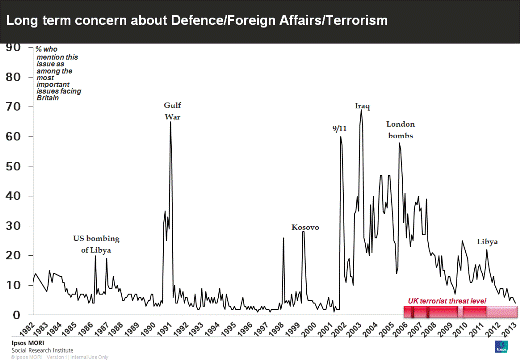Events, not threats - current public concern about foreign affairs, defence and terrorism

Almost two years ago I penned an article about the public’s concern about defence, foreign affairs and terrorism in light of our involvement in the conflict in Libya. Our monthly Issues Index, tracking the most important issues facing the country, gives us unparalleled insight into long term public opinion, and, that month, it was clear that the conflict had had an impact, as one in five (22%) placed the issues of defence/foreign affairs/terrorism among the most important issues facing the county, an increase from 12% two months prior.
However, since then, concern about these issues has steadily ebbed away, and, in our January poll, just 4% - one person in 25 – mentioned this issue. It is currently as concerning to us as petrol prices (also 4%), and drug abuse (5%).
The current level of concern is the lowest that we have recorded since prior to 9/11, though it comes at a time when terrorism, and the deployment of UK forces, is high on the agenda, with troops on the ground in Mali, and the prime minister visiting North Africa to discuss security in the wake of the terrorist attack in Algeria. Furthermore, discontented rumblings from Argentina over the Falkland Islands, and the recent announcement of the ring-fencing of defence equipment budgets, indicate that this issue will rise higher on the national agenda in 2013.
However, will it, in turn, rise higher on the public’s list of priorities? This issue, like no other, is hugely volatile and can create seismic shifts in opinion, most notably when lives are lost, or put at risk, as in the last two wars in Iraq. Concern is likely to increase, though the trends show us that it is more likely to leap, rather than creep up.

There are two possible reasons for the current low positioning of this issue. One is that our economic concerns mean that we are unable to focus on anything else; over half of the public (52%) mention the economy, and it has dominated the conversation for over four years. However, even with other issues such as unemployment or the NHS leading the pack in the past, concern about defence was still able, in times of war or following a terrorist attack, to supersede them as the top issue. More likely is that, despite the UK terrorist threat remaining “substantial”, we are unable to identify a single clear and present danger either to us or to our troops.
Indeed, our long term data shows that opinion moves as a response to an actual event that has already taken place, rather than the threat of one, and, it may well be the case that we only become worried, either for the safety of our troops in combat, or for ourselves on home soil, when the danger is very real, or indeed, has already passed.



